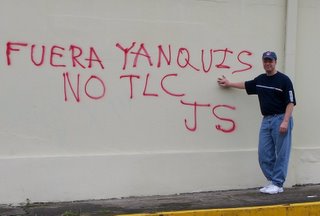TLC (CAFTA)

What is TLC? It's not "Tender Loving Care," for sure. At least not in the minds of these Costa Rican University students. (This is a picture taken just outside our apartment building). TLC is the Spanish acronym for "Tratado de Libre Comercio." In English it is CAFTA - Central American Free Trade Agreement. TLC is the equivalent to NAFTA - North American Free Trade Agreement (the trade agreement between Canada, the U.S. and Mexico) but involves the Central American countries along with the Dominican Republic.
The goal of TLC (CAFTA) is the elimination of trade barriers (Import Duty) between treaty partners. It is as controversial as NAFTA was in the United States but TLC did pass both Houses of the U.S. Congress and was approved by the President. Labor unions strongly oppose the treaty because of fears of the loss of manufacturing jobs and more outsourcing to less developed countries.
In Costa Rica, an economically liberal democracy with some socialist leanings, many in the state universities still favor a strong socialistic policy. Some even wish for a communistic government like that of Cuba (note the color and symbols on the banner the student is holding).

For these, there is good reason to fear. Currently all the utility companies in Costa Rica, i.e. telecommunications, internet, cable television, electricity and even pensions and securities are state owned. With TLC these monopolies or closed markets would eventually have to open to national and international competion. Many feel this would cause instability and uncertainty and a loss of national control.
Private business tends to support TLC because with it they see the opportunity for an open market and an opening of the Costa Rican economy to international investment. They also understand that with the lowering of import taxes the average citizen would be able to afford the less expensive products. And the government would not lose its much needed revenew because with the growth of business the national tax base would be broadened to more than compensate for the loss in import duty. It would probably even grow the natioal treasury. At least that is the theory goes.
In the U.S., supporters of TLC (CAFTA) understand the advantage U.S. exporters, especially exporters of agricultural products, would gain by the Central American countries lowering their import duties. The U.S. today has one of the lowest import taxes for overseas products coming into the country. It is well under 10 per cent. But when our exporters try to sell to Central American countries, there is an import duty of 40 per cent. With TLC, these trade barriers would be brought down and evened-out. This would help our farmers sell more products at cheaper prices abroad.

Whatever one thinks of NAFTA and TLC (CAFTA) one thing is certain, there is much heat in the discussion. In this photo I'm standing near graffiti saying "Get out Yankee, No TLC." It's a good thing I'm a Cleveland Indian and not from New York (note my hat). As an American living abroad I am sometimes cornered into defending the policies of our government.

The more I am aware of policies such as this one, the better I can explain the intent of Congress, the President, and the economically conservative view on capitalism.

<< Home